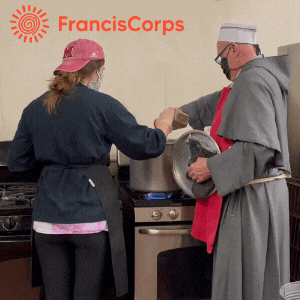Ryan Majsak is a recent University of Notre Dame graduate, who is serving with the Jesuit Volunteer Corps in San Francisco as a law clerk with the Eviction Defense Collaboration. Read on to find out why sheep and goats inspire him to serve, and what cooking on a tiny budget can teach you!
What is it like living in community with other volunteers?
Living in community with other volunteers is both a blessing and a challenge. It can be difficult to share such an emotional and stressful experience with people I have just met, but it’s also a great chance to create lifelong relationships. We are a family. We eat together, we spend time together, we laugh together, we argue with one another, we make community budget decisions, we talk about our faith together, we talk about world issues together, and we share in each other’s highs and lows. During my service, I wanted to live in community, because I didn’t want my experience to have start/pause button that I pressed when I arrived and left work. I wanted to be immersed in a lifestyle that was reinforced by my community members. Reflection and discussion with others living similar experiences can help give perspective on things that I am experiencing, and likewise I can learn from what my community members share from their placements. We are diverse in our backgrounds and beliefs and we learn how to respect and be open to others’ opinions and values. It’s not an easy situation, but it’s one that has forced us to learn and grow with each other.
What inspired you to serve?
Often times I reflect on a passage from Matthew 25 about the Sheep and the Goats:
When the Son of Man comes in his glory, and all the angels with him, he will sit on his glorious throne. All the nations will be gathered before him, and he will separate the people one from another as a shepherd separates the sheep from the goats. He will put the sheep on his right and the goats on his left. Then the King will say to those on his right, ‘Come, you who are blessed by my Father; take your inheritance, the kingdom prepared for you since the creation of the world. For I was hungry and you gave me something to eat, I was thirsty and you gave me something to drink, I was a stranger and you invited me in, I needed clothes and you clothed me, I was sick and you looked after me, I was in prison and you came to visit me.’
Then the righteous will answer him, ‘Lord, when did we see you hungry and feed you, or thirsty and give you something to drink? When did we see you a stranger and invite you in, or needing clothes and clothe you? When did we see you sick or in prison and go to visit you?’
The King will reply, ‘Truly I tell you, whatever you did for one of the least of these brothers and sisters of mine, you did for me.’
This passage has become a constant presence in my mind when I encounter someone in need. For if I claim to love Jesus, how can I ignore those in whom He dwells? I decided to do service because I wanted to work directly on behalf of and in solidarity with others. Through my placement at the Eviction Defense Collaborative in San Francisco helping low income tenants fight their evictions, I have the opportunity to play a part in making a significant positive impact on others’ lives every day.
What continues to inspire you, now that you’ve started?
Every JV house has a patron who is well known for their work in the social justice sphere. Our house’s patron is Rev. Dr. Martin Luther King, Jr. We have many pictures and artwork that decorate our apartment that have his likeness and quotes. The central piece in our living area is a painting done by a former JV who used to live in our house that has the Golden Gate Bridge and underneath has a quote prominently displayed from MLK Jr., “Life’s most persistent and urgent question is, ‘What are you doing for others?’” It is inevitable that at some point each day that I glance at that painting to the point that the quote seems to endlessly echo in my head. Now that the initial “high” of joining a fast-paced nonprofit organization has worn off, patience, focus, and compassion is more difficult to maintain during the long intake of clients or the more mundane tasks of the job. MLK’s words reinforce and remind me of the reason why I joined the JVC and help me find the extra motivation necessary to give my entire self to those whom I am serving.
Has “simple living” been a struggle so far?
Simple living is certainly a challenge, but it is a rewarding one. Cooking with a very modest budget has reminded me that eating for taste and complete fulfillment is a privilege that not everyone experiences. I have been surprised just how resourceful we have been and how far we can stretch our limited food budget. It makes things easier that we are living simply as a community, and we are able to support each other on days that it is especially difficult.
It also is hard to suffer when we have so many generous people and organizations trying to feed and entertain us. I have joked with my community members that we are the most well-connected poor people in the city. Former Jesuit Volunteers, friends, family, and our organizations invite us to picnics, barbecues, meals, and then send us home with all of the leftovers. In fact, their generosity is so abundant that as a community, we have talked about how guilty we feel about receiving so much from others. We dedicated ourselves to a simple lifestyle not so that we could continue living comfortably, just on the dollar of someone else, but to understand and fully embrace in solidarity the decisions and realities that those we work alongside deal with on a daily basis.
For me, an unforeseen challenge has been the slightly uncomfortable adjustment to accept so many handouts without repayment or reciprocation. I have had to allow myself to become humble enough to just accept others’ persistent generosity with mere gratitude. I now understand the feeling of pride and almost a sense of dignity that is lost when receives handouts out of pity or because of the existence of an unequal relationship. Now that I have been on both sides of that interaction, I am now more aware of the feelings of those receiving aid and how to make them feel as comfortable as possible to help them maintain their dignity.
Another challenge is limiting our use of technology. We decided to get WiFi with the use of our personal stipends for the main purposes of communication with friends and family and for working on applications. However, the temptation exists to rely on devices rather than people to entertain ourselves. Living simply emphasizes relationships over things, and technology can be a large barrier to that.
To learn more about serving with the Jesuit Volunteer Corps, click here!


 Thousands of faith-based service opportunities can be at your fingertips with the RESPONSE. Download the latest edition today!
Thousands of faith-based service opportunities can be at your fingertips with the RESPONSE. Download the latest edition today!
